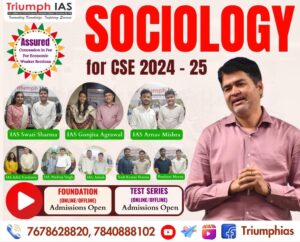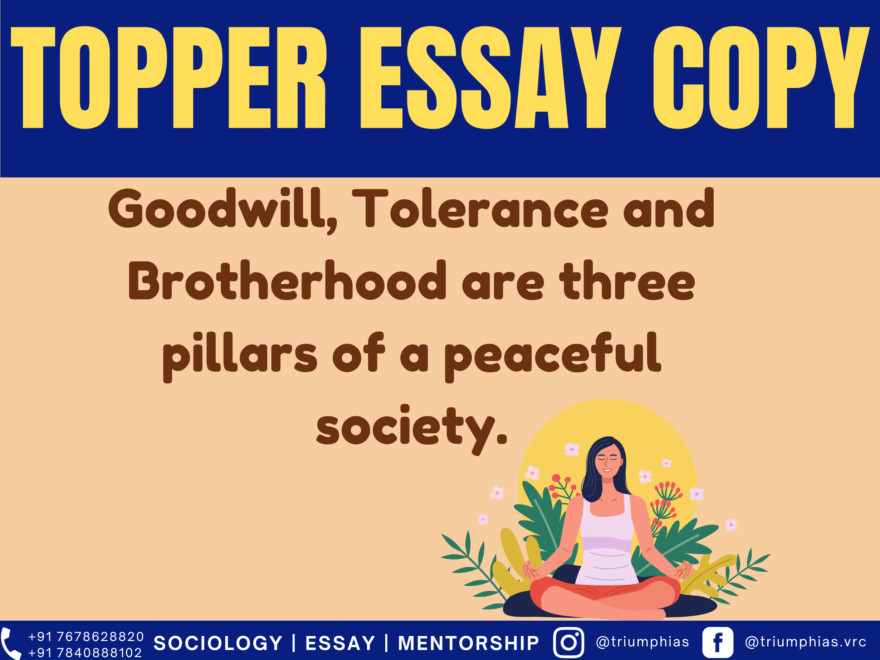
IAS,UTKARSH DWIVEDI

Essay Topic:

Goodwill, Tolerance and Brotherhood are three pillars of a peaceful society.
(Relevant for Essay Writing for UPSC Civil Services Examination)
Goodwill, Tolerance and Brotherhood are three pillars of a peaceful society.“Oh dear man, what do you want? asked god, A peaceful society, replied man. But you’re so ill-motivated, a peaceful society asks goodwill. But you’re so intolerant, a peaceful society asks tolerance. But you’re so selfish, a peaceful society asks brotherhood. I have the power to create you, dear man, you have the power to create a peaceful society.” The search for a peaceful society has been an incessant and never-ending journey for humankind. This essay would try to answer what is a peaceful society, why it is needed, what are the ingredients of a peaceful society, what happens when any of these ingredients is absent, and what we could do to create a peaceful society to fulfill the ultimate search of humankind. To answer the first question, what is a peaceful society, one must understand the definition and importance of society. A society is a collection of many individuals. It is important because God has not created humankind to be a self-sufficient entity. To realize his dreams, goals, and aspirations, he needs a society, just like an artist needs an audience. “A man becomes a man in the presence of a society.” Hence, a peaceful society is one where all individuals can accomplish their life goals while staying happy, satisfied, and loved in the presence of others, and no one becomes a roadblock in someone else’s life. But how to make a society peaceful is the million-dollar question. Fortunately, we know that three essential ingredients—goodwill, tolerance, and brotherhood—help in creating a peaceful society. Let us first deal with goodwill. “Will” means motivation to do something. This “will,” when it motivates us to do good for ourselves and for the society, is called “goodwill.” Goodwill has a domino effect. When you do good, you generate goodwill in the society which entices others to do good to you. Take, for example, giving alms to a poor person. If someone sees you helping a needy person, others too come forward to help the poor, thus generating goodwill. Recently, a video of an old man from Delhi’s Malviya Nagar went viral on Twitter wherein he is crying since no one is coming to his dhaba (restaurant) to eat since the lockdown. As soon as the video went viral, people thronged to his dhaba to eat the next day. The happiness in the tears of the old man was invaluable. Another instance of goodwill is when PM Modi had asked people to voluntarily donate to the PM CARES fund. In no time, people from all walks of life started donating to the fund, with donations ranging from Rs 1 to Rs 100 crore. But what if we don’t do good? We have examples of that too. Look at countries like Syria, Sudan, Yemen, Iraq, etc. Here the people are less interested in doing good and more in capturing power, killing other factions, usurping resources. Hence the consequences of not doing good are nasty, poor, brutish, and self-depreciating. Having discussed the first ingredient let’s take the second one—tolerance. What is tolerance can be best defined in the words of Voltaire – “I may not agree with what you speak, but I will defend to death your right to do so.” When we are accepting of the words, deeds, religion, caste, culture, creed, race, gender, profession, etc., of another person, we are said to be tolerant of the other in a society. What this means is – tolerance is a two-way street. Tolerance does not come from the attitude of “my way or the highway.” A photo of a Muslim woman with a child dressed as Krishna shows tolerance in a society. When we eat sevai during Id, light candles during Diwali, distribute gifts during Christmas and bow our heads in respect in a gurudwara, we are tolerant. When we sit and eat with people of all castes, not be jealous when a woman or a Dalit achieves success, not address people from North-East with derogatory terms, we are tolerant. The other side of the picture too demands attention; i.e., what is intolerance. Imagine a heated TV debate wherein the anchor does not allow others to speak. Imagine a Dalit being beaten just because he is a Dalit. Imagine if a Muslim is lynched on the suspicion of keeping/eating beef. Firstly, the above are examples of intolerance. And secondly these are not mere words of imagination but instances of real life from our society. This takes us to the third ingredient of a peaceful society—brotherhood. Brotherhood can be best defined as the feeling of being one regardless of our faith, culture, caste, ethnicity, etc. The word “fraternity” meaning brotherhood has found mention from the French Revolution of 1789 to the Preamble of our constitution, highlighting its importance. In a society, instances of brotherhood can be government programs like National Cadet Corps and National Service Scheme, wherein student volunteers help community members in times of need. Another instance would be, say a disaster when people from the society come together to help each other in overcoming the disaster as was seen during Tsunami, Kerala floods, Cyclone Amphan, Titli, etc. And what if the society lacks brotherhood? Then we would witness instances from pre-Independence India like the revolt of 1857 when many sections of the society did not come forward to help the soldiers or what happened during the partition of our country when Hindus and Muslims killed one another. In conclusion, we can say that it is only our actions that generate goodwill, tolerance, and brotherhood in a society. We will have to bring a behavioral change in ourselves. We will have to take a step forward in the right direction, we will have to hold our nerves even when we disagree with others, and we will have to understand and assimilate the inherent unity of humankind to build a peaceful society of our dreams. |
To master these intricacies and fare well in the Sociology Optional Syllabus, aspiring sociologists might benefit from guidance by the Best Sociology Optional Teacher and participation in the Best Sociology Optional Coaching. These avenues provide comprehensive assistance, ensuring a solid understanding of sociology’s diverse methodologies and techniques
Meta Tags:
Urbanisation, Blessing, Disguise, Economic Growth, Cultural Diversity, Environmental Challenges, India, Social Inclusion, Sustainable Development, SDG Goals, Urbanization is a blessing in disguise, Laxman Tiwari, Laxman Tiwari upsc, Laxman Tiwari CSE, Laxman Tiwari Essay copy, Laxman Tiwari Essay test copy
Why Vikash Ranjan’s foundation Classes for Essay?
Proper guidance and assistance are required to learn the skill of writing essay topics in CSE examination. VIKASH RANJAN SIR at TRIUMPH IAS guides students according to the Recent Trends of UPSC, making him the Best Essay Teacher for Essay writing UPSC.
At Triumph IAS, the Best Essay Writing Coaching platform, we not only provide the best study material and applied classes of Essay for IAS but also conduct regular assignments and class tests to assess candidates’ writing skills and understanding of the subject.
Choose The Best Essay Writing Teacher for IAS Preparation and Know our Approach for Essay?
- The Programme is Planned & Executed in a Way that You Write a good Essay for obtaining Effective Score of 140 Plus.
- In this programme we provide Classes on
- How to INTRODUCE The Topic in Context of the THEME of the Essay
- How to Elaborate & Explain the Topic-Theme on Temporal Scale & Sectoral Scale as well as Intellectual Scale in the MAIN BODY of the Essay.
- How to Sum up the Topic in CONCLUSION in Context of the Essay Topic Theme.
- ︎We will Teach You How to use the Knowledge Matrix of General Studies & Optional to write a Good Essay more Logically and Coherently.
- After the Classes You have to “Write to Learn & Learn to Score” .This means You have to Write the Essay Test Papers & Learn from the Feedback & Discussions.
Why Essay is Important and What We Offer in “Essay Test Series”?
- Triumph’s Essay Upgradation Test Series (Under Personal Guidance of Vikash Ranjan Sir) doesn’t only focus on improving student’s linguistic skills but also focus on improving student’s ability to comprehend the topic-sentence (subject) recall & relate the facts, concepts, propose thesis-statements, and logically assimilate the ideas & counter ideas with clarity in expression on temporal & Sectoral Scales of knowledge.
- Further students are provided one-on-one INTERACTION* Session with Vikash Ranjan Sir. Students get personal feedback on their strength and weaknesses, regarding what is ‘good about their essay and what more should be done to make it a better one’ by Vikash Ranjan Sir.
Why to take up this “Essay Test Series and Foundation” Course?
- Essay is Low hanging Fruit. Marks in Essay is Effectively Contributing in Final Selection in New Pattern of Mains Exam. With a Well Developed ‘Knowledge Matrix and Rigorous Practice’, One can Score upto 160 + in Essay. So IAS Aspirants should never Ignore Essay Preparation
- Inculcating Writing Competency in Essay for IAS, which is Different from Essay in English, Essay in School and College.
Follow us :
🔎 https://www.instagram.com/triumphias
🔎https://www.youtube.com/c/TriumphIAS
🔎https://t.me/VikashRanjanSociology
Find More Blogs…
| Compare and contrast Karl Marx’s and Max weber’s | Karl Marx- Historical Materialism |
| Position of Women In the Modern Indian Society | Sociology: Social system and pattern variables |
keyword: Goodwill, Tolerance and Brotherhood are three pillars of a peaceful society. , Goodwill, Tolerance and Brotherhood are three pillars of a peaceful society. ,Goodwill, Tolerance and Brotherhood are three pillars of a peaceful society. ,Goodwill, Tolerance and Brotherhood are three pillars of a peaceful society. ,Goodwill, Tolerance and Brotherhood are three pillar

